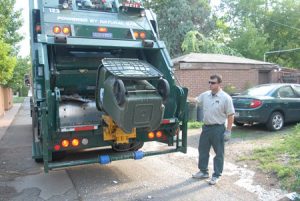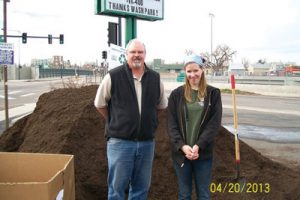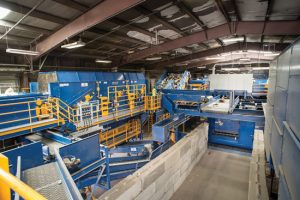Alpine Waste & Recycling (Commerce City, CO) was founded in 1999, serving Aurora, CO, with a single truck. By the mid-2000s, Alpine Waste & Recycling grew to not only have more than 75 employees and over 30 trucks, but it also began annually appearing on a local business magazine’s list of fastest-growing companies. In 2007, Alpine opened its Altogether Recycling® plant, and the company reached a milestone of 2,000 individual commercial accounts.
Today, Alpine Waste & Recycling has 230 employees, 94 waste collection trucks, and revenues of more than $40 million, with operations in four key areas: waste collection, landfill, recycling and composting. The recycling plant processes 8,200 tons of material per month, composed of all traditional recyclables plus gable-top boxes, mixed rigid plastics and now polystyrene (packaging material, egg cartons, meat trays, etc.).
Serving the Colorado Front Range with its waste collection operations from Fort Collins to Castle Rock, and as far as 35 miles east of Denver to its landfill near Bennett, CO, Alpine Waste & Recycling’s services cover 16 counties. Additionally, they collect recycling from areas as far-flung as the Western Slope, southern Colorado, Rocky Mountain ski towns, and even Wyoming to the north and Nebraska to the east.
An Upward Growth Curve
Alpine Waste & Recycling has continued its amazing growth with a 15 percent projected annual increase in revenues for 2015, and the company recently placed an order for its 100th waste collection vehicle. About half of that fleet runs on environmentally friendly compressed natural gas. While the depressed value of recyclables has challenged its recycling division, and although the tight labor market has expanded payroll costs, the company remains committed to growth in all aspects of the business, relying on its message of superior customer service and environmental responsibility. Four significant new accounts (including Denver International Airport) have kept Alpine Waste & Recycling on its growth trend line; and the company projects revenue increases of at least 13 percent in 2016.
John Griffith, President of Alpine Waste & Recycling, points out that the three biggest challenges they have encountered are the recent recession, fluctuating recyclable markets and the competitive landscape. “We got through the recession by managing our finances in a conservative manner, keeping in mind that our customers would have to find a way to dispose of its trash and recyclables no matter what the financial conditions. We just had to remind them that they would receive the most personal customer service with Alpine. While we knew we just had to be patient to outlast the recession, we similarly understood we needed to exercise patience and conserve spending to get through the troughs within the recyclable material valuations. Those dips are built into our long-term business model, and we will weather them.”
Because the competition in the Denver area is intense, Griffith explains that some waste and recycling companies have greater resources than others, allowing them to undercut Alpine Waste & Recycling’s sales efforts when dealing with clients who are focused almost exclusively on price. However, the company constantly re-emphasizes its superior customer service and recognizes that Alpine might not be the right company for everyone—just those who value outstanding customer service, the broadest spectrum of waste diversion services, and leading-edge technology used to provide those services.
Currently, Alpine Waste & Recycling’s greatest test is an ongoing effort to persuade Colorado businesses and residents to divert increasing amounts of their waste into the recycling stream. Colorado has traditionally lagged the nation’s average rate of diversion, in some cases recycling only a third of the amount that other, more recycling-conscious states have managed to recycle. One headwind is the relatively low cost of (and high availability of) rural real estate in Colorado, which translates into lower landfill fees. “We know we have to join the rest of the nation in educating residents about the importance of waste diversion and the huge impact it has on the environment,” says Griffith. “At every opportunity, we make people aware of how much they are recycling individually and collectively, and how it compares with other locations around the country. We have also worked with municipalities that have sought ways to increase their waste diversion rate. Our Web site also lists some sample resources (electricity, water, trees, etc.) that our recycling has conserved, in hopes of motivating people to increase those numbers.”
Internal and Outreach Programs
When it comes to internal operations, Alpine Waste & Recycling has extensive job orientation, skills training and safety training for all appropriate personnel. Every new driver spends at least one month on the job under the mentorship of a senior-level person prior to any solo activity. The training also includes 40 hours of classroom and in-field sessions. Non-drivers/equipment operators also receive training in diversity awareness and workplace harassment issues. On top of the introductory classroom and a hands-on safety program provided for all new equipment operators, the company also requires that those employees engage in monthly refresher training.
On its community Web page, Alpine Waste & Recycling lists 19 organizations that the company supports in various ways, including in-kind service, volunteer commitments and direct cash donations (see Community Outreach sidebar). Some of the most prominent organizations with the most significant attachments include Firefly Autism, Delores Project, Blue Star Recyclers and Women’s Bean Project. Also, Alpine Waste & Recycling welcomes tour groups at its Altogether Recycling® plant, and hundreds of school-age children receive an intense educational experience at the plant every year.
Commitment to Innovation
With the company’s consistent growth through even the most difficult economic climate and its record of non-stop innovation in the industry, Alpine Waste & Recycling has created good-paying jobs for the area and invested millions of dollars—most recently in the expansion of the recycling facility that increased capacity by 150 percent. While revenue growth has slowed somewhat from the earlier annual rates in the neighborhoods of 40 and even 50 percent, the compound average annual growth rate remains in the 30s over the past 16 years, and the most recent growth (in a relatively mature market) is at 15 percent.
The company’s commitment to a spirit of innovation began with the belief that a privately held company in Colorado could in fact build its own, successful single-stream recycling plant and attract third-party haulers to share the resource. “Most recently, Alpine became the first company in Colorado to accept polystyrene (Styrofoam®) into its single-stream operations,” says Griffith. In between, they were the first waste and recycling company in the state to use trucks fueled by compressed natural gas, the first in the state to accept mixed rigid plastics in the single stream, the first to accept gable-top boxes, the first to offer a complete package of waste-recycling-and-compost on a commercial basis, and the first to offer customers an Automated Sustainability ReportTM (ASR). “The ASR is specific to each of our customers’ waste services, and is available to every customer; it shows exactly how much material the customer was able to divert from the landfill by using Alpine’s suite of services. The report also shows the environmental impact of the customer’s activity.”
The Altogether Recycling® Plant has been a particular focus of innovation, even beyond the types of materials that it receives. When the plant opened in 2007, it was the only privately held single-stream plant in Colorado. The recent expansion included a replacement of both balers (with one from Bollegraff and the other from Machinex) and those balers are arranged in the operation so that Alpine has complete redundancy to bale material from any material bunker. In other words, when one baler is down for maintenance or repair, the other baler takes over seamlessly.
Alpine Waste & Recycling’s East Regional Landfill, is located outside Bennett, CO, about 35 miles east of Denver and six miles east of Denver International Airport. It sits on 165 acres and accepted about 290,000 tons of waste material in 2015. Its multi-layer liner, leachate drainage system and network of monitoring wells and methane gas probes provide for stringent and ecologically sound site management. The Alpine composting facility is on 5.74 acres within the landfill campus, with a 4,000 square-foot concrete pad.
Looking to the Future
Alpine Waste & Recycling has outgrown two headquarter locations in its 16-year history, and the company is currently building a new 10-acre headquarters with a 21,000 square foot building, more centrally located to the important Interstate 25 corridor, which will include facilities for vehicle maintenance and a compressed natural gas fueling station. The company recently added four prominent major accounts to the list of commercial customers in addition to the hundred or so smaller ones it adds every year, and the goal is to add four more in 2016. Says Griffith “Our customers are not just customers—they become partners in our efforts to educate the public about the ways that Alpine’s services can create a healthier environment; and, in turn, the business grows almost exponentially.” | WA
For more information, contact Steve Caulk at (303) 410-4971, via e-mail at [email protected] or visit www.alpinewaste.com.



